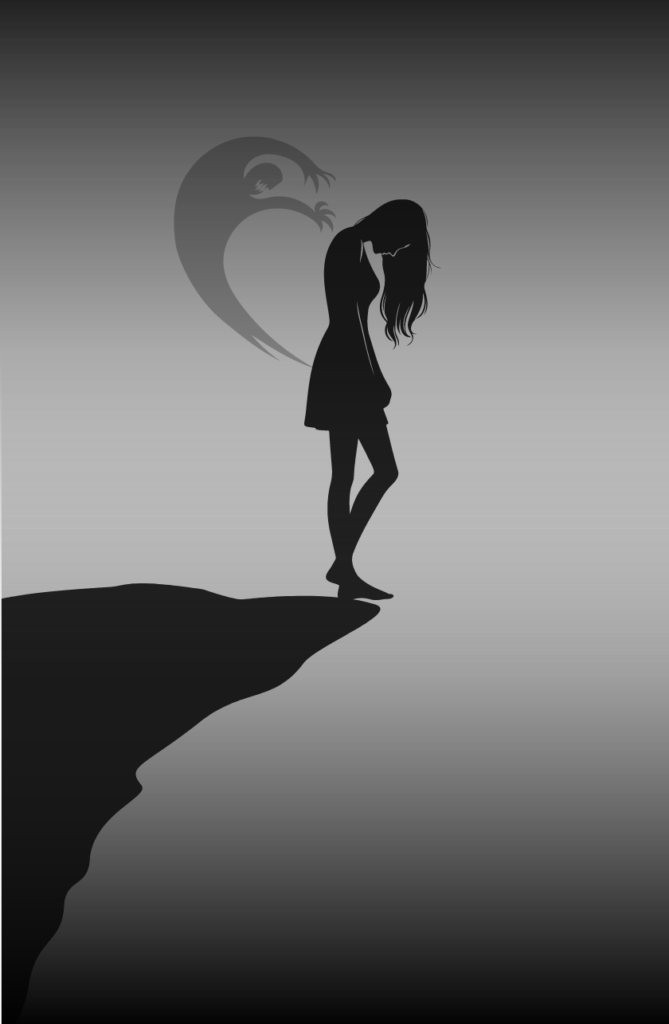Trigger Warning: Suicidal thoughts, mental health, disordered eating
This post discusses suicidal thoughts, mental health struggles, and disordered eating behaviors. These topics may be sensitive for some readers. Please proceed with caution.
September is Suicide Prevention Month, and I’m taking this time to shed light on my own personal battle with suicidal thoughts. These thoughts are intertwined with the many inner voices that distort my identity and shape my existence — voices that whisper doubts, amplify fears, and convince me that I’m not enough. They don’t just criticize — they sabotage, control, and drive me dangerously close to the edge. Sometimes, these whispers are barely audible; other times, their roars are deafening.
Behind blue eyes and a manufactured smile, I struggle to find stability in the chaos of life. It’s unsettling how deeply one can suffer without anyone noticing. The world sees the mask of normalcy I wear, but they do not see the invisible war that rages within me — the relentless push and pull between the desire to keep going and the voices urging me to give up. By sharing my story, I hope to bring attention to the often unseen struggles of living with suicidal thoughts and encourage others to truly see and support those who are fighting in silence.
Early Battles: The Growing Shadow of Suicidal Thoughts
Childhood Loneliness
Loneliness has followed me since I was a child. I felt misunderstood at school and at home. I never had many friends, and I spent most of my time in my room, studying or writing. Even at such a young age, I remember feeling sad a lot, despite no apparent reason. Perhaps the saddest feeling in the world isn’t being alone, but, rather, being surrounded by people who don’t understand you. I think I wanted so badly to be seen, especially by my parents, which is why I always tried so hard in school. Always the straight-A student. They never asked me to be, but I always wanted to make them proud. Always searching for validation, for acceptance, for love. But no matter how much I accomplished, I couldn’t fill the void inside me.
Teenage Isolation
In my teenage years, the emptiness grew. Once again, I was reminded that I didn’t belong. I had no place in this world. Crowded hallways and classrooms, and yet, still all alone. With no friends or a strong support network, disordered eating behaviors became false companions. At home with my parents, it was hard to fully give in to this voice. I found myself trying to eat less at dinner time – restricting calories because I needed to lose weight, despite already being underweight. Then, I’d find myself sneaking food into my bedroom after they’d gone to sleep at night, succumbing to a binge and feeling like a failure. I convinced myself that once I got to college, I would be able to stop this self-destructive cycle. I would be in control.
College Challenges
College came, and it was still the same story. Once more, I felt out of place. I couldn’t fit in with people. Instead, I found purpose, yet again, in being the straight-A student, the high achiever, the one with drive and determination. Every moment that I felt unseen or misunderstood, I convinced myself that I didn’t need anyone. The only person I needed was myself. I was going to succeed, do the best I could, and make something of myself. The disordered eating behaviors continued, and compulsive exercise – cardio, in particular – became the punishment when I overate. My entire existence revolved around classes, studying, food, and exercise.
When I landed a summer internship, I thought this would bring me the reprieve I was looking for. I would have a new environment – a bedroom in a shared house with three other girls. But changing the setting didn’t change the old patterns. Instead, I’d created another prison for myself. While my roommates sat together on the couches in the living room, watching Love Island, laughing, and sharing conversation, I found myself isolated yet again. Still searching for that sense of belonging that was nowhere to be found.
Once more, food offered solace, and I found myself deeply ensnared in the binge-restrict cycle. I couldn’t stop. It’s grip tightened, refusing to let me go. This wasn’t the first time suicide crossed my mind, but it’s the time I remember most vividly because it was so overwhelming. I felt incredibly helpless, hopeless, and yearning to escape. I began to realize it was never the situation. It was always me. I could never escape myself.
The Corporate World: Caged Inside Cubicle Walls & My Own Mind
The Weight of Capitalism
After college, I entered the corporate world – another new chapter, another chance at change. But working at a bank with people twice my age made me feel even more disconnected. I quickly realized I’d chosen the wrong college major, the wrong career, and the wrong path. My pursuit of independence had taken over my entire identity, and success, in its materialistic form, was the only thing I had.
And now, in adulthood, with its promise of freedom, I felt trapped by the weight of capitalism — the relentless pressure to achieve and sustain myself. The very thing I had spent my life striving for now felt suffocating. I felt lost, and once more, wishing to escape. Cubicle walls seemed to close in around me. Then, when I returned home — to one half of a duplex I was renting — those walls seemed to close in around me too. Loneliness followed me once more, caging me inside my own mind.
I constantly questioned, “What’s the point? What is all this for?” I’d spent four years getting a degree to work a job I hate, to live in a place I hate, to still have nothing to show for it or no one to share my so-called success with. I couldn’t imagine doing this for another 40+ years. Wandering this Earth alone, working a meaningless job, and living the same day over and over again. A mix of sadness, numbness, and confusion overwhelmed me, leaving me feeling everything and nothing all at once. My will to keep going was dwindling, as I waited and waited for things to get better, but they never did.
Exercise: A Form of Escapism
After spending too many days locked inside a cubicle and then coming to an empty house at night, I knew I had to change something. Do something. At the beginning of 2023, I mustered the courage to join a gym. And, at that time, it was the best thing I could’ve done for myself. It gave me an outlet for the mental turmoil, a place to forget about the stresses of daily life and just focus on personal growth. With this newfound passion, I found myself a little further from the edge.
But this would turn into a new obsession, a new form of escapism. I soon became dependent on exercise – strength training, in particular. It transformed from a healthy habit to a compulsion. I felt like I needed it to get through the day. To survive the day. I began sacrificing sleep to wake up earlier in the morning to workout. When I was at work, all I could think about was exercise. Sitting at a desk for eight hours a day made me feel uncomfortable in my skin. I wasn’t burning enough calories. Once more, food and exercise were my only companions – my only way to cope with life.
The Return of the Dark Thoughts
My discontent with that job grew so overwhelming that I was desperate to escape. I remember talking to my mom on the phone and breaking down. Through tears, I admitted, “I feel so trapped.” But once more, the situation (the job) was only part of the problem. I felt trapped in every aspect of my life, just as I always had. Financially, I was alone. Emotionally, alone. My thoughts echoed, “It’s never going to get better. You’re always going to be alone.” I frequently thought about how long it would take for someone to find me if something were to happen. No one checked up on me. There was no one to check up on me, except for my parents. And 99% of the time, I was the one picking up the phone to call them. No one cared. No one would notice. Why doesn’t anyone ever notice?
New Job, Familiar Void: The Battle Continues
I started my new job at the end of March this year, and I felt more hopeful than I had in a long time. It was a role I genuinely wanted, in an industry I cared about. I told myself that everything I’d gone through had led me to this moment – that maybe everything was worth it, and now, maybe things would turn around. And they should have. I should be happy. Fulfilled. But the emptiness remains. Sometimes I think I’m determined to make myself miserable. Perhaps I’m just too self-destructive. Addicted to pain and suffering. I don’t know what it is, but I can’t seem to fill the void. I feel that I just keep digging myself deeper and deeper into this hole, and every time I start to climb out of it, I fall back down, spiraling into past behaviors.
The Unending Cycle
Recently, the suicidal thoughts have intensified, as I’ve become tangled in the binge-restrict cycle once more. From the moment I open my eyes, I already dread the day, convinced it will be another failure. I spend each day and night alone, haunted by the thought that it’s always been this way and always will be. No matter what I do, I can’t seem to escape the prison of my own mind.
Living with passive suicidal ideation feels like being caught in a storm, where the eye of calm is forever out of reach. It’s not that I want to die; I just don’t want to live this life or be trapped in this version of myself any longer. I wish I could kill the brokenness inside, erase the darkness, and finally see the light. But instead, I’m stuck in a cycle that feels impossible to break, where every attempt at escape pulls me further into the very thing I’m trying to outrun.
Teetering on the Edge: Hidden Struggles Behind the Masks
The irony is that, on two separate occasions, someone has described me as a “ray of sunshine.” Isn’t it funny how the ones who are consumed by darkness can be a source of light for others? Despite drowning on the inside, teetering on the edge, no one suspects a thing. They only see the masks I wear: the perfectionist, the dedicated one, the girl who never falters.
What they don’t see is the girl who cries herself to sleep at night, the girl who barely survives the day. Her thoughts are endless. Who would miss her? How long would it take for someone to notice she was gone? What difference would it make? She feels isolated, with only her parents as her closest connection. Maybe, she thinks, her absence could ease their burdens — perhaps her life savings could get them out of debt. And maybe, just maybe, leaving this world would silence the tormenting voices and provide the escape she desperately seeks.
This is what it’s like to live on the edge; every day feels like walking a tightrope, balancing between the will to keep going and the urge to give up entirely. On the outside, I might look like I have it all together, but inside, I’m in a relentless battle against the thoughts that threaten to pull me under.
Navigating the Darkness: Confronting Suicidal Ideation
For most of my life, I’ve believed that the answer was to fix everything around me — environments, jobs, people. But I’ve realized that this fight is a deeply internal one. It’s about confronting the parts of myself that I’ve hidden away, the pain I’ve buried, and the thoughts that tell me I’m unworthy. Every day feels like a test of endurance, a challenge to find something — anything — to hold on to.
I’ve tried different ways to cope. I write, hoping that by putting my thoughts on paper, I can make sense of the chaos inside. I exercise, sometimes pushing myself past my limits, trying to outrun the voices in my head. Sometimes, I talk to my mom about my sadness and loneliness, but I’m never fully transparent with her. I don’t want her to worry, and I often feel that she, and others, won’t understand. As a result, I end up feeling more isolated.
Although I continue to navigate the complexities of my mental health, including persistent suicidal thoughts, I’m still here – standing strong and hoping that one day I’ll find the peace I’m searching for. Until then, I’ll keep taking small steps and remind myself that I am more than the darkness I carry.
Finding the Light: Suicide Prevention & Awareness
Suicide Prevention Month reminds us that these battles are often fought in silence, hidden behind smiles and daily routines. According to the World Health Organization (WHO), every 40 seconds someone loses their life to suicide. This statistic may catch your attention, but it doesn’t fully capture the lived experiences — the subtle signs and the unspoken struggles that many endure.
I’m not writing this post as some kind of plea for help but to raise awareness and encourage empathy. By sharing my story, I hope to let others know they aren’t alone. Struggling with our mental health doesn’t make us weak or broken; it makes us human. In a world that judges and shames, we must be each other’s allies, offering compassion and breaking the stigma that keeps us isolated.
If you’re reading this and facing a similar battle, or if you feel like no one cares or understands, know that I do. I see you. Keep fighting, my fellow warrior. Together, we can find moments of light even in our darkest times.


